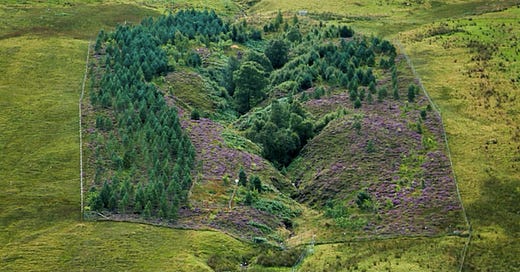Another Monday, Another Naive Weekly - Curated stories on Technology and Internet Culture.

Yesterday I watched The Serengeti Rules. It is a fascinating documentary telling the story of a small group of researchers who over a lifetime changed how we think about nature.
The image above is from the film. It shows a small area of the highlands in Scotland. The contrast between the flourishing green forest in the middle and the surrounding green fields seems stark. You’d think a wide range of fertilisers and other tricks have been used to result in such big differences of vegetation.
In reality the only difference between the flourishing square and its surrounding is wild wolves. Yes, wolves.
It is no surprise that nature is a complex ecosystem. Plants grow from sunlight. The growing plants allow for the herbivore to fill their stomachs, which in turn provides food for the predators. Since childhood we have been taught about this food chain, what we have not been taught is that not all animals are equal in the their contributions to the ecosystem they live in.
For years the highland of Scotland had been only grassland, then one of the researchers portrayed in The Serengeti Rules decided to fence an area and re-introduce wild wolves. This small intervention changed the whole ecosystem.
In different ecosystems, different animals have a similar effect as the wolves have in Scotland. In Asia the spiders ensure flourishing rice fields. And in the water, sea otters and seastars are often the upholders of a rich natural environment.
The scientists call these animals for keystone species. Named after the the top stone in an arch that keeps the entire structure together. While all stones are equal, the keystone is more more important for the entire structure than any other stone.
Similarly, when you remove the keystone species, the whole community collapses. Instead of a rich ecosystem you get monocultures.
It is hard to spot systems that are downgrading, because we are all already embedded in them and we don’t even know what upgraded systems look like.
Watching the film I naturally connected the studies of nature to the realities of the internet. It made me question who and what are the keystone pieces of the internet? Who is ensuring that the internet flourishes and doesn’t downgrade to a monoculture?

Proto-list for Keystone Internet Pieces
To initiate the list of keystone internet pieces, I propose three species that might hold the different places together and ensure that they don’t become monocultures.
Steven Pruitt, Wikipedia addict
Most of the internet is written by a very small percentage of people. On Reddit about 1-3% of the users write all the posts. And even within the contributors, the there is a strong difference. For example, the top 1000 editors on Wikipedia have contributed two-thirds of all edits, with Steven Pruitt alone contributing 3 million edits. If we didn’t have these people, what would we be reading?Jordan Ramirez, Instagram husband
An increased number of people are living of the internet. Writing articles, creating podcasts or posting photos. What we often forget is the person behind the scenes, the person supporting and enabling the people to contribute to the internet. Maybe Jordan Ramirez and other Instagram husbands are the keystone of the internet?Nameless, Internet cleaners
Not everything deserves to be posted nor seen. As shown in the film The Cleaners, the big internet platforms rely on humans to remove material from the internet, often this can be reduced to looking at d-pics all day long. As promised by a job post for online moderators in The Philippines, the cleaners are “dedicated to make the internet a safer space for all”.

Ecosystems
Of course The Serengeti Rules was so fascinating for me because it stressed the importance of system thinking. More than blaming individuals, I believe it is important to look at the systems that fosters certain behaviour.
Sick systems
Written as a guide on how to keep people hooked, this article provides a good guide to recognize sick systems. Anyone creating online spaces and gatherings should read it and make sure to do the opposite. Let’s create some utopian communities.Healthy comments
Change My View is a subreddit dedicated to changing people’s view (surprise!). Brian Clark argues that by imposing strict rules, the forum is becoming the prime model for how online conversations should be.Evolving music
Over the past five years the average length of a hit song has decreased by 20 seconds. Recent research indicates that this is because of streaming services like Spotify. Musicians are paid per stream, not by per streamed minute. This creates incentives to shorten the songs and produce more of them.

Random Internet
Just a handful of stories from the past weeks I’ve failed to share with you.
What we could be doing with all the time we waste on the internet
Apple is no longer producing iPods (Goodbye!)

Naive Weekly
Hi, I’m Kristoffer and I’m one of the founders of co-matter. You just read Naive Weekly - Curated stories on Technology and Internet Culture.
Last week I went a bit of concept with the newsletter. It became long, and the thoughts become un-developed. Thanks to Martin for still encouraging me to go on and do what I want. This article about the what happens with mail during natural disasters goes out to you, good luck with Hours Beirut!
What’s on your mind?
<3
Kristoffer



